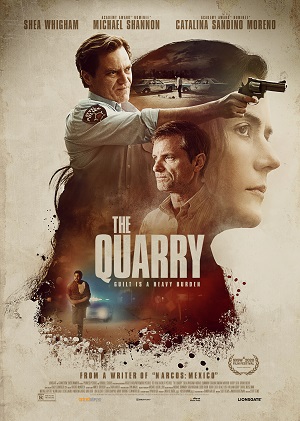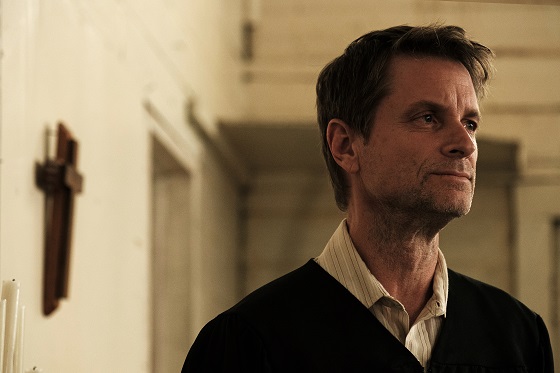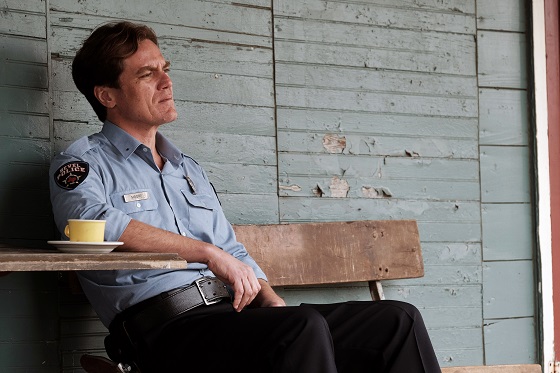

[Rating: Swiss Fist]
Drunk preachers, flawed cops, and fugitives on the run all mixed in the cauldron of West Texas give The Quarry a decidedly Cormac McCarthy feel, though it doesn’t quite reach those heights through its 98-minute runtime. The story of a criminal who takes on the identity of a minister, the film bats around some interesting ideas, and is propped up by a stellar supporting turn by the always-reliable Michael Shannon, who is magnificent, here. The Quarry lives and dies by its lead, however, and whether it’s because the part isn’t written well, or because Shannon keeps blowing his co-star off the screen, this is where things falter, and the larger effort suffers for it.
On the way to his new congregation, a minister (Bruno Bichir) in a van comes across a stranger (Shea Whigham) lying along an isolated stretch of West Texas highway. The minister gives this mystery man some food and water, along with a ride towards the town where his ministry assignment awaits him, taking long slugs off a wine bottle en route. The pair stop at a quarry a few miles from their destination where they engage in an argument that turns physical, leading to the accidental murder of the minister at the hands of the mystery man.
After burying the body, the man decides to assume the preacher’s identity and to go to the town to take up the ministry. Exhausted upon arrival, the man brushes off advice to take his possessions out of the vehicle to avoid theft, and sure enough, the next morning the van is cleaned out and on blocks. When the man goes to the town’s police chief (Shannon) to report the theft, he is able to pull down a wanted poster with his face on it without anyone noticing, yet this is the first of several close-calls with the chief, who struggles to reconcile his growing suspicions about the new padre.

As the film unfolds from here, the man finds that his quiet, unpolished demeanor and straightforward sermons connect with the largely Mexican congregation, who take an immediate shine to him. The van break-in and the investigation connected to it threaten the man’s position in town, however, and move the thieves involved into the orbit of the chief as he creeps closer to the truth about the man and the murdered minister. It’s a slow burn, yet it moves with a steady, deliberate hand that only occasionally fails to connect all the story’s dots.
Based on the novel by Damon Galgut, the script is an inventive adaptation, transposing the original South African setting to West Texas. Discrimination against the church’s congregants transfers seamlessly from South African blacks to Mexican Americans, and serves as one of the thematic pillars of the narrative. Director Scott Teems appears to be interested in the ways that disenfranchised or lost individuals fall between the cracks of society and coalesce into “other” communities, and whether it concerns the mystery man or the Mexicans he preaches to, there’s plenty of outsider politics to dissect, here.
Whigham is the audience’s guide through all of this, and while he’s consistent with his performance, there’s an impenetrable aspect to it that holds much of The Quarry back. Far from a sympathetic presence, he introduces himself as a character by killing a preacher, then spends the majority of what follows saying and doing as little as possible. Although the implication early on is that the man takes the preacher job out of desperation, as a practical means to disappear into a new life, there’s hints that the words in the gospels (and the town’s reception to his readings of them) is getting to him. Whigham keeps all of this locked off and under the surface, however, leaving precious little daylight for the audience to peek through to discover his arc or growth.

Shannon, on the other hand, is a kaleidoscope of character and contradiction, laying crumbs for the audience to discover something new about the guy in each scene. What appears on the surface to be level-headed and fair-minded reveals itself to be steeped in passive racism and corruption. Far from a caricature, though, the chief also carries on a loving affair with a local Mexican woman (Catalina Sandino Moreno), who he does seem to genuinely care about despite his inability to show that in any kind of traditional/public manner.
It’s a fascinating character made all the better by a nuanced performance in the hands of an actor fully capable of bringing all of this to life. It’s funny, too, because tying the chief character and the pervasive racism within the town into the broader themes of redemption and forgiveness should have been the difficult part, yet where The Quarry struggles is when it tries to stitch its lead into this broader framework. The “man” character does indeed develop throughout the picture, yet the path towards that is kept locked up behind Whigham’s performative firewall.
Interesting, though a bit fragmented during its final 10-15 minutes, The Quarry is nevertheless an engaging exploration of salvation and rebirth, and what it means to live outside of a broader community while still knowing a sense of place. The film asks its audience to explore who really belongs, and why, and pushes them even further to delve into the cyclical nature of violence and oppression. Shot well (the cinematography is indeed striking) and earnestly presented, the movie ultimately stumbles where it is most vulnerable: the lead. Opening this week, The Quarry might be just the ticket for viewers that find themselves lost, though it will likely be lacking for those that consider themselves found.





Comments on this entry are closed.